Vermont becomes 5th U.S. state to ban gay conversion therapy; governor says treatment is 'absurd,' widely discredited

Vermont became the fifth U.S. state to ban gay conversion therapy following the signing into law of such a bill by Gov. Peter Shumlin on Wednesday.
The new law prohibits reparative therapy for minors suffering from same-sex attraction, also known as "conversion therapy," regardless of whether a young person's same-sex attraction is unwanted and without regard for parents' desires in the matter.
The same measure is already in effect in California, Illinois, New Jersey and Oregon.
In signing the law, Shumlin claimed that "it's absurd to think that being gay or transgender is something to be cured of."
He said conversion therapy has been widely discredited by the scientific community, citing a 2015 report by the Substance Abuse and Mental Health Services Administration (SAMHSA) which "found that variations in sexual orientation and gender identity are normal, and that conversion therapies or other efforts to change sexual orientation or gender identity are not effective, are harmful, and are not appropriate therapeutic practices."
"Conversion therapy to me is tantamount to child abuse," said Melissa Murray of Outright Vermont, according to LifeSiteNews.
Xavier Persad of the Human Rights Campaign (HRC) said the Vermont law is needed to educate people about conversion therapy.
On the other hand, those who support conversion therapy say the complaints against the treatment are false.
"Outlawing the therapies that help some people with same-sex attractions or gender-identity conflicts is, at its very heart, unjust. The civil liberty of individuals to choose therapies should be protected and preserved, not crushed by lawyers," wrote author and speaker Walt Heyer in LifeSite News.
Heyer, who has admitted having undergone sex-change surgeries twice, said he later found out that the "lifesaving solution for me was therapy and restoration of my birth gender."
Heyer said he knew of gays, lesbians and transgenders who shared similar experiences.
"Years of pain had turned many of our lives upside down. By turning to therapies, we healed the shame and deep hurt so that the pain no longer drives us to unwanted behaviors," he said.











